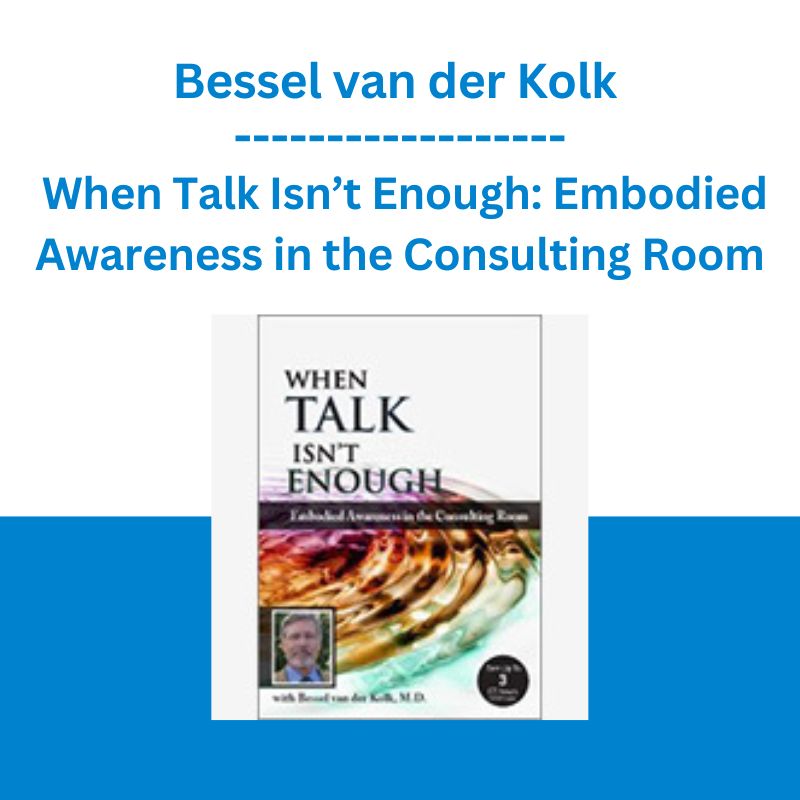*** Proof of Product ***
Exploring the Essential Features of “Bessel van der Kolk – Psychotherapy Networker Symposium: When Talk Isn’t Enough: Embodied Awareness in the Consulting Room”
After being traumatized, the body keeps pumping out stress hormones that make people feel frazzled, agitated, or shut down. Talk therapy alone doesn’t reset the limbic system, the part of the brain that creates a sense of fear and helplessness. In this workshop, you’ll learn the latest research surrounding traumatic imprints, and learn if and how traumatic imprints can be addressed using techniques drawn from yoga, theater, and somatic therapy.
Speaker
Bessel A. van der Kolk, MD
Bessel van der Kolk, MD, has spent his career studying how children and adults adapt to traumatic experiences, and has translated emerging findings from neuroscience and attachment research to develop and study a range of potentially effective treatments for traumatic stress in children and adults.
In 1984, he set up one of the first clinical/research centers in the US dedicated to the study and treatment of traumatic stress in civilian populations, which has trained numerous researchers and clinicians specializing in the study and treatment of traumatic stress, and which has been continually funded to research the impact of traumatic stress and effective treatment interventions. He did the first studies on the effects of SSRIs on PTSD; was a member of the first neuroimaging team to investigate how trauma changes brain processes, and did the first research linking BPD and deliberate self-injury to trauma and neglect in early childhood.
Much of his research has focused on how trauma has a different impact at different stages of development, and that disruptions in care-giving systems have additional deleterious effects that need to be addressed for effective intervention. In order to promote a deeper understanding of the impact of childhood trauma and to foster the development and execution of effective treatment interventions, he initiated the process that led to the establishment of the National Child Traumatic Stress Network (NCTSN), a Congressionally mandated initiative that now funds approximately 150 centers specializing in developing effective treatment interventions, and implementing them in a wide array of settings, from juvenile detention centers to tribal agencies, nationwide.
He has focused on studying treatments that stabilize physiology, increase executive functioning and help traumatized individuals to feel fully alert to the present. This has included an NIMH-funded study on EMDR and NCCAM funded study of yoga, and, in recent years, the study of neurofeedback to investigate whether attentional and perceptual systems (and the neural tracks responsible for them) can be altered by changing EEG patterns.
His efforts resulted in the establishment of Trauma Center, that consist of a well-trained clinical team specializing in the treatment of children and adults with histories of child maltreatment, that applies treatment models that are widely taught and implemented nationwide, a research lab that studies the effects of neurofeedback and MDMA on behavior, mood, and executive functioning, and numerous trainings nationwide to a variety of mental health professional, educators, parent groups, policy makers, and law enforcement personnel.
Dr. van der Kolk is the author of the NY Times best-selling book The Body Keeps The Score.
Speaker Disclosures:
Financial: Dr. Bessel van der Kolk is a professor at Boston University School of Medicine, the Director of the Trauma Center, and the National Complex Trauma Network. He receives royalties as a published author. Dr. van der Kolk receives a speaking honorarium, recording royalties, and book royalties from PESI, Inc. He has no relevant financial relationships with ineligible organizations.
Non-financial: Dr. Bessel van der Kolk has no relevant non-financial relationships with ineligible organizations.
Objectives
- Demonstrate breathing, posture, facial, and vocal exercises to energize your therapeutic presence and enhance your mirroring of the client’s words and expressions
- Implement techniques for projecting different messages (empathy, support, authority, guidance) through how you stand, sit, and walk during a therapeutic session.
- Outline how awareness can bring increased mindfulness and optimism into your approach with clients
Outline
The limitations of exposure therapy
- Desensitization to pain
- Methods that encourage a fuller mind/body integration
Strategies to make the most of your own healing presence
- Breathing
- Posture
- Mirroring your clients’ words and expressions
Emerging tools and research for healing from complex trauma
Target Audience
Counselors, Social Workers, Addiction Counselors, Marriage & Family Therapists, Nurses and other Mental Health Professionals
Please see the full list of alternative group-buy courses available here: https://lunacourse.com/shop/










 Ed Ponsi - Forex Trading
Ed Ponsi - Forex Trading